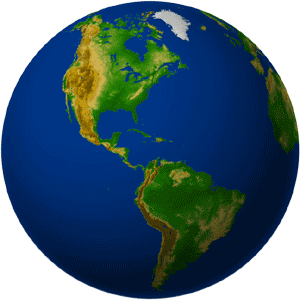Winner
Diverse in Unity
Premise: Americas are never populated by humans. Let's say the land bridge from Asia never forms, the ice doesn't melt in time, simply put the ancestors of ancient Native Americans never make it to Americas. Moreover, no people arrive until say AD 1000, so no Polynesians, no Inuit, no nobody. North and South America remain a pristine continent in its natural form, without any human interference. Yes, it is unlikely, but that's the basic point of this thread, so please do not try to find ways around it.

My questions:
Discuss

My questions:
1) would large mammals, possibly some of the Pleistocene megafauna, survive if there were no humans over-hunting them?
2) given that there was no real contact between the Old World and the New World until the 15th century, would history be altered somehow or would it be the same until the point of discovery?
3) could colonization of Americas begin in AD 1000 with the arrival of Vikings? I understand they evacuated Vinland settlements (well, camps) because of their conflicts with native tribes. If there had been no such tribes, could the Vikings have begun colonizing Newfoundland and the lands around the Gulf of Saint Lawrence in the 11th century? Was it even possible, given the distances from Europe? Would the knowledge of the new continent in the West spread? Historically, the discoveries faded into obscurity and the later explorers had no idea the Vikings got so far.
4) how would the absence of Nat. Americans affect European colonization beginning in the 15th century? After all it was originally motivated by gold, which was being extracted from conquered peoples in Mesoamerica, Caribbean and the Andes, right? Would it be faster, or slower? Historically, Native Americans were both fierce enemies and good trading partners, so there's room for many interpretations.
5) How would the lack of gold/silver imported from Americas affect Europe and the rest of the Old World? What important events would not have taken place?
2) given that there was no real contact between the Old World and the New World until the 15th century, would history be altered somehow or would it be the same until the point of discovery?
3) could colonization of Americas begin in AD 1000 with the arrival of Vikings? I understand they evacuated Vinland settlements (well, camps) because of their conflicts with native tribes. If there had been no such tribes, could the Vikings have begun colonizing Newfoundland and the lands around the Gulf of Saint Lawrence in the 11th century? Was it even possible, given the distances from Europe? Would the knowledge of the new continent in the West spread? Historically, the discoveries faded into obscurity and the later explorers had no idea the Vikings got so far.
4) how would the absence of Nat. Americans affect European colonization beginning in the 15th century? After all it was originally motivated by gold, which was being extracted from conquered peoples in Mesoamerica, Caribbean and the Andes, right? Would it be faster, or slower? Historically, Native Americans were both fierce enemies and good trading partners, so there's room for many interpretations.
5) How would the lack of gold/silver imported from Americas affect Europe and the rest of the Old World? What important events would not have taken place?
Discuss







 The first courts, largest cities, first universities, etc. And what were the british and French building in North America in the meanwhile? Plantations...
The first courts, largest cities, first universities, etc. And what were the british and French building in North America in the meanwhile? Plantations...